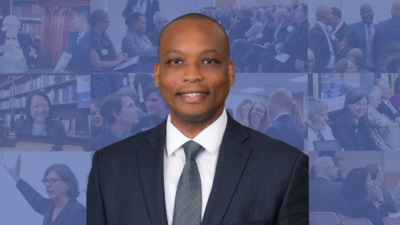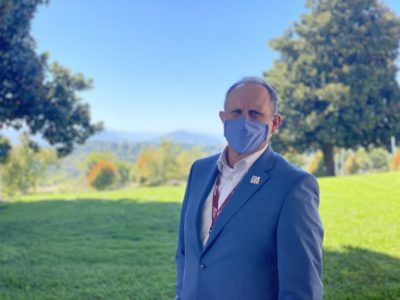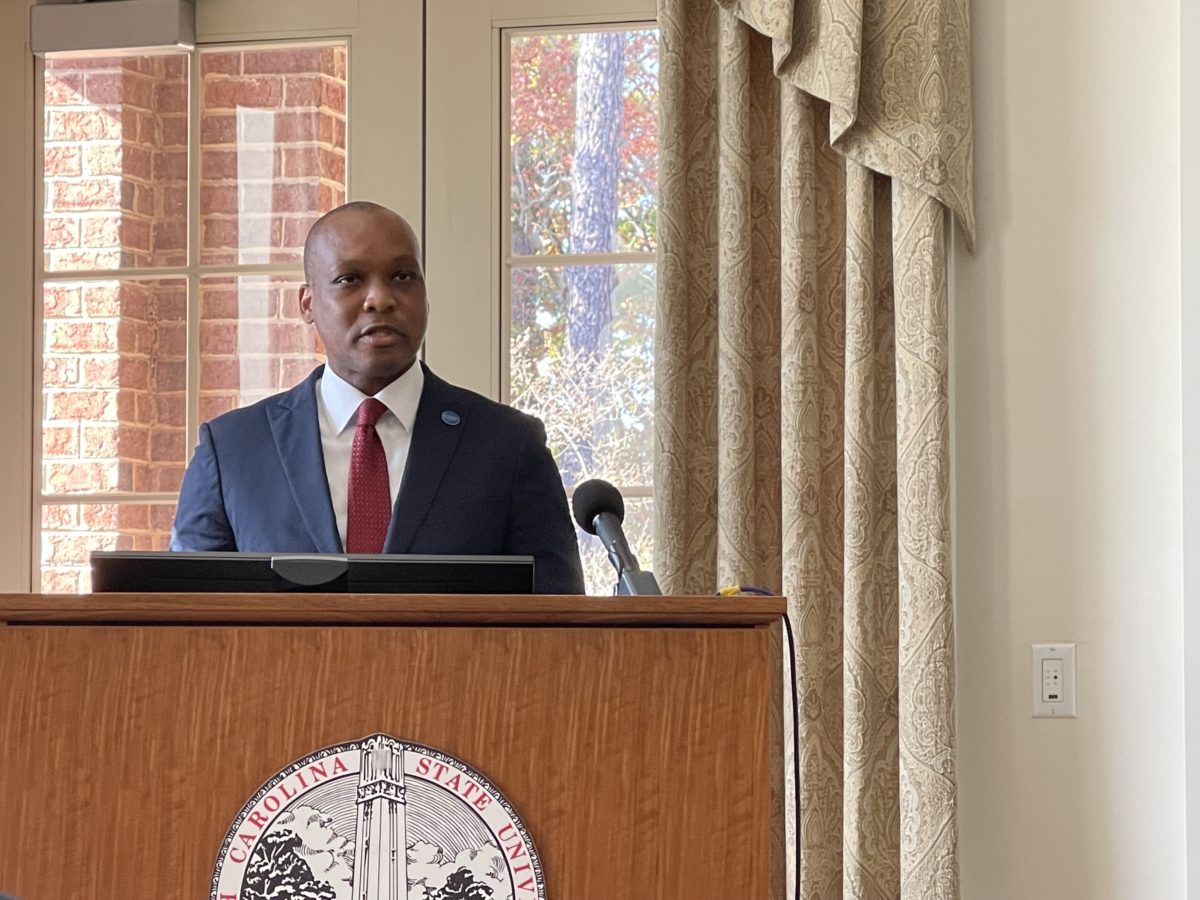

|
|
“The need to improve postsecondary education access has always been critical to the work of community colleges. But think about the moment we’re in, the critical inflection point in our existence, a convergence of crises facing our communities— economic disruption, a racial reckoning, and the pandemic.”
Gregory Adam Haile, president of Broward College
Dr. Gregory Adam Haile, president of Broward College, opened the 2021 Dallas Herring Lecture on Nov. 16 by reminding attendees that the challenges before them require candid conversations, highlighting that candor and progress are inextricably linked.
Since 2015, community college thought leaders across the nation have delivered the Dallas Herring Lecture. Hosted by North Carolina State University’s College of Education and the Belk Center for Community College Leadership and Research, the lecture is a nod to the late W. Dallas Herring who is recognized by many as the “father” of the North Carolina Community College System.
Haile said Dr. Herring changed the trajectory of North Carolina. “His work is also proof positive of how an intrinsic, yet innovative idea can materially expand educational access,” he said.
Dr. Audrey Jaeger, executive director of the Belk Center and W. Dallas Herring professor at NC State, acknowledged Herring’s many contributions to the system, but said his legacy is a complicated one.
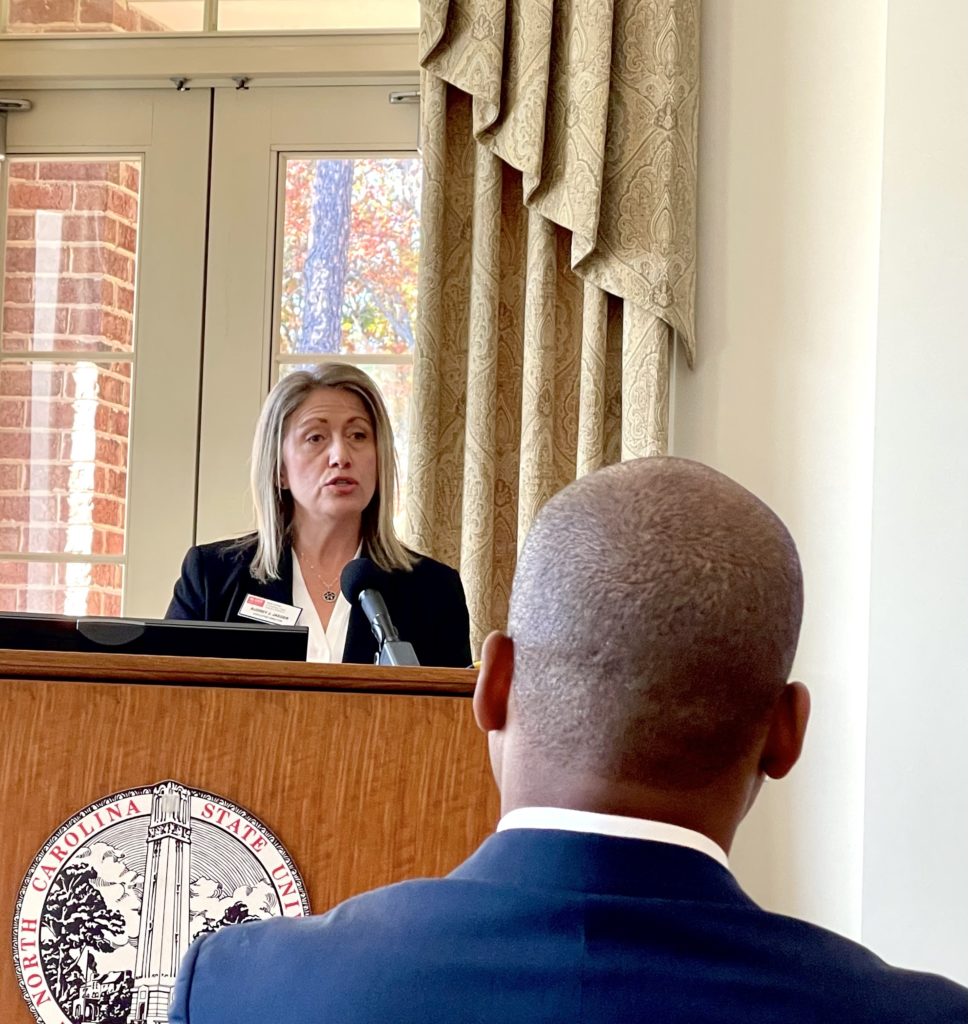

“While Herring swam against the current stream, increasing access to North Carolina Black citizens, his work was not without blind spots. Though he was a remarkable leader, he was a man of his time, and he held some troublesome views about segregation and integration at different points in his career,” Jaeger said. “We must be clear that we are not honoring the hero without flaws, rather we are celebrating the work of an imperfect human who honestly grappled with the issues of the day, and who dared to, in his words, rock the boat.”
Beyond celebrating the work W. Dallas Herring left behind, the lecture is a chance to engage with national issues, where top community college leaders speak on urgent and emerging topics that not only address the issues but propose a path forward.
In this year’s lecture titled, “Redefining Access: The Power of Proximity,” Haile reimagines higher education access through a collaborative, replicable, and disruptive model, emphasizing that community colleges were designed to magnify access, particularly for the most challenged among us.
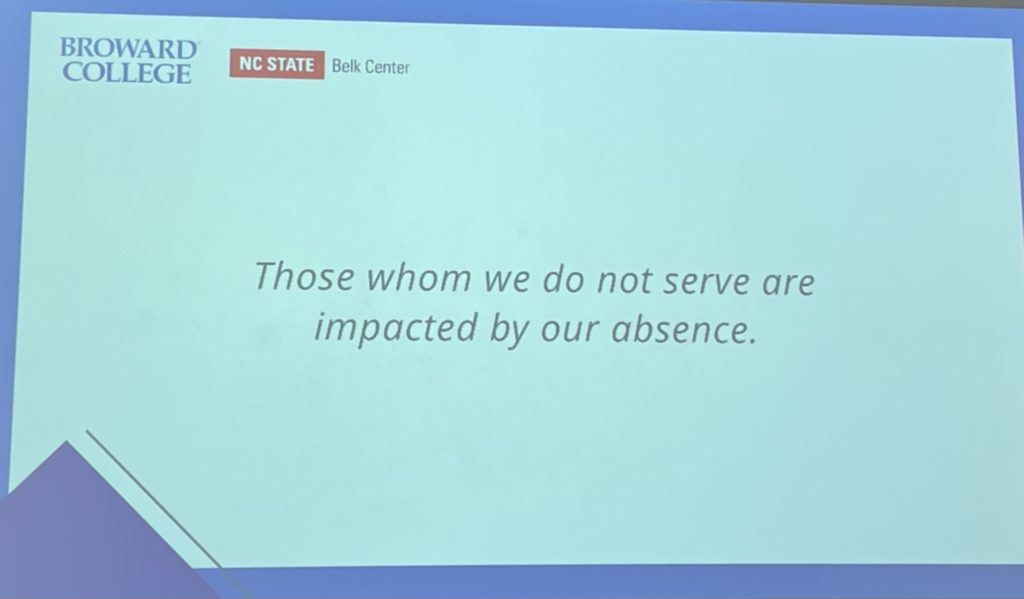

“Community colleges are obligated to develop innovative approaches to be proximate with the communities we are designed to serve – to ensure equitable access to higher education,” Haile said. “We know that the work we do daily is … measurably impactful to the people we serve. Perhaps especially during our most dire times.”
Haile asked attendees to consider the implications of education attainment on the trio of troubles — economic disruption, racial reckoning, and the pandemic.
According to Haile, in 2020, employment declines most impacted those with less than a high school diploma. The higher the education attainment level, the less impact. The same is true among COVID-19 death rates.
“COVID-19 death rates were substantially elevated for persons without a college degree,” Haile said.
To reiterate his point, Haile told a story about a young Black boy growing up in a violent urban neighborhood with no college graduates or attendees around. The young boy was Haile.
Until sixth grade, Haile had never heard the word college. He attended his neighborhood high school, which had one of the highest HIV and teen pregnancy rates and was among the first cohort of schools to require metal detectors. Academic rigor and postsecondary attainment were the least of his interests. Haile graduated high school among the top 15% of his class with a GPA of 2.7. And not a single college ever reached out to him.
With many deterrents and little proximity to a college, Haile had a hard time believing he belonged in college. He was even told that he would never survive if he attended.

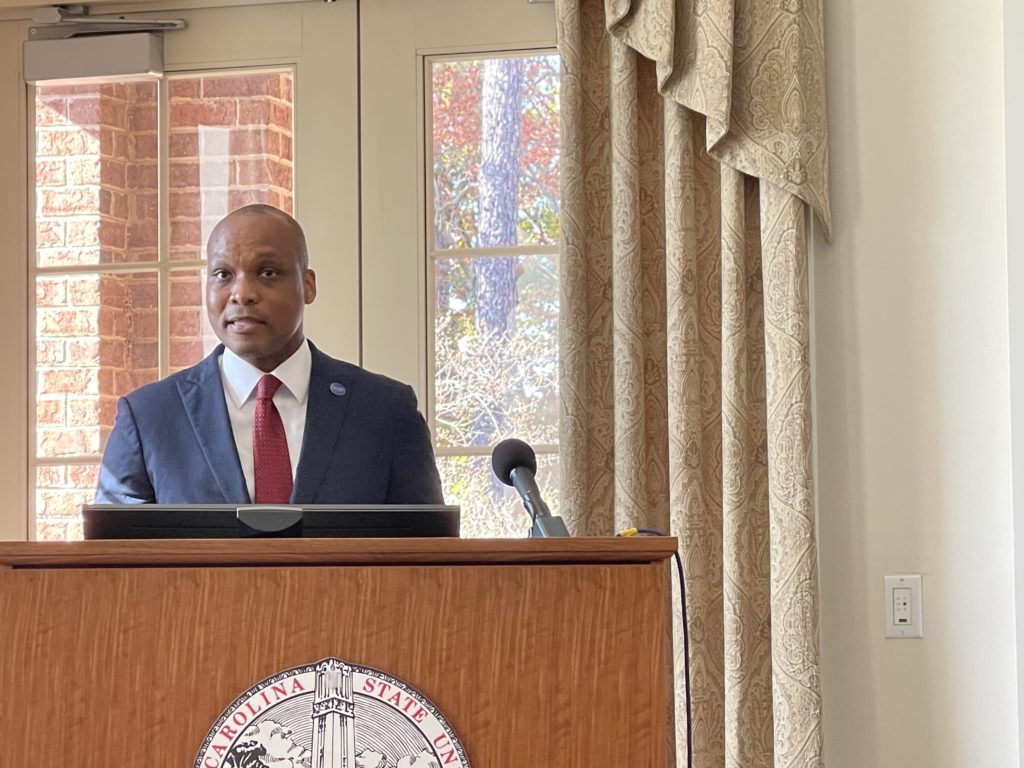
Gregory Adam Haile. Emily Thomas/EducationNC 
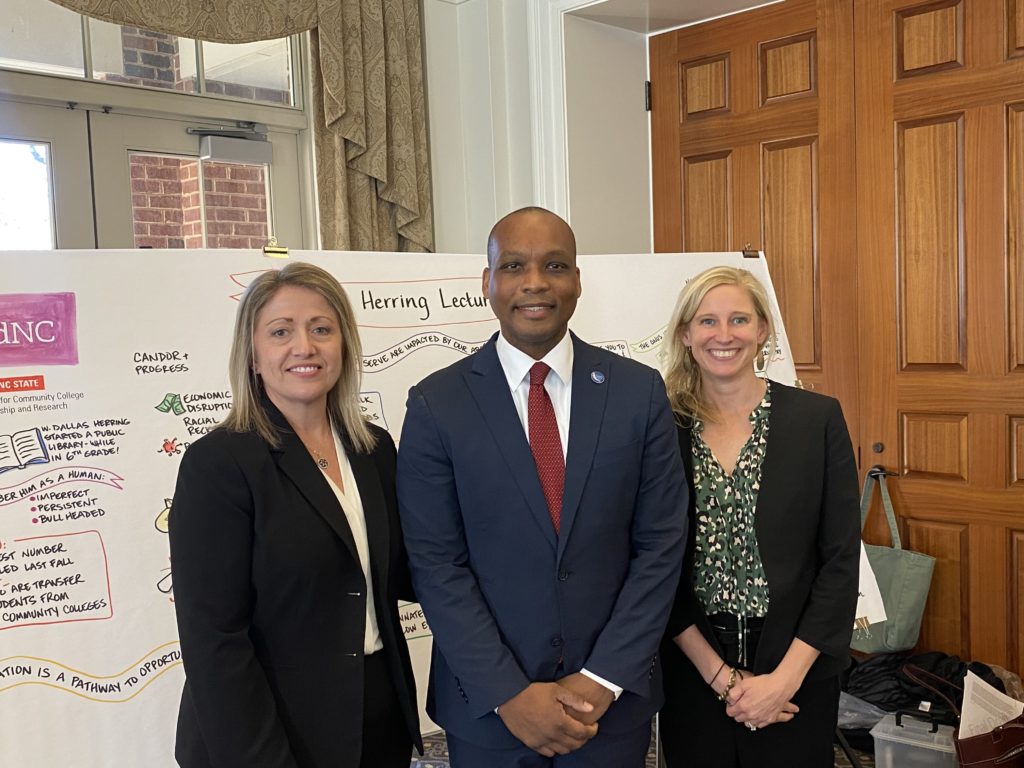
Dr. Audrey Jaeger (left), Gregory Adam Haile (center), and MC Belk Pilon. Nation Hahn/EducationNC
The proximity that Haile describes is not just the physical location of a college, though location is crucial.
“[Proximity] must also encompass the expectations and social connections that a community might have to a collegiate institution,” he said.
The design of community colleges was intentional — to magnify access particularly for the most challenged.
And while community colleges enrolled 41% of all undergraduates nationally, and despite serving a disproportionate number of low-income, non-traditional, first-generation, immigrant, and ethnic and racial minority students, there are many who community colleges are still not reaching, Haile said.
Chief among those reasons is the challenge of proximity. There are three proximities that Haile said must be addressed to equitably reach those that community colleges are designed to serve.
The first is physical. Geographically, education is out of reach for students. Haile cited transportation being a main reason. And while online classes have expanded due to the pandemic, there is still a digital divide that exists.
“The individuals that we are designed to serve and support, they have few transportation options,” he said. “They have the least amount of time. They are unfamiliar with who we are or what we do. Yet we expect those same individuals to come to us.”
The second proximity is social, which, according to Haile, is how proximate or close members of the communities colleges serve feel to the institution.
“Building social proximity starts long before students get to our institutions,” Haile said. “We must create that sense of belonging long before individuals arrive.”
The third proximity Haile describes is financial — how residents view the possibility or opportunity to afford higher education. But tuition is not the only challenge, and for many, not the challenge at all. Haile said the pandemic highlighted the reality that students need help with more than tuition support. Students need help paying for basic needs like food, housing, child care, and transportation to campus.
So what is the solution?
According to Haile, leadership involves more than just identifying the problems. It is also about creating solutions.
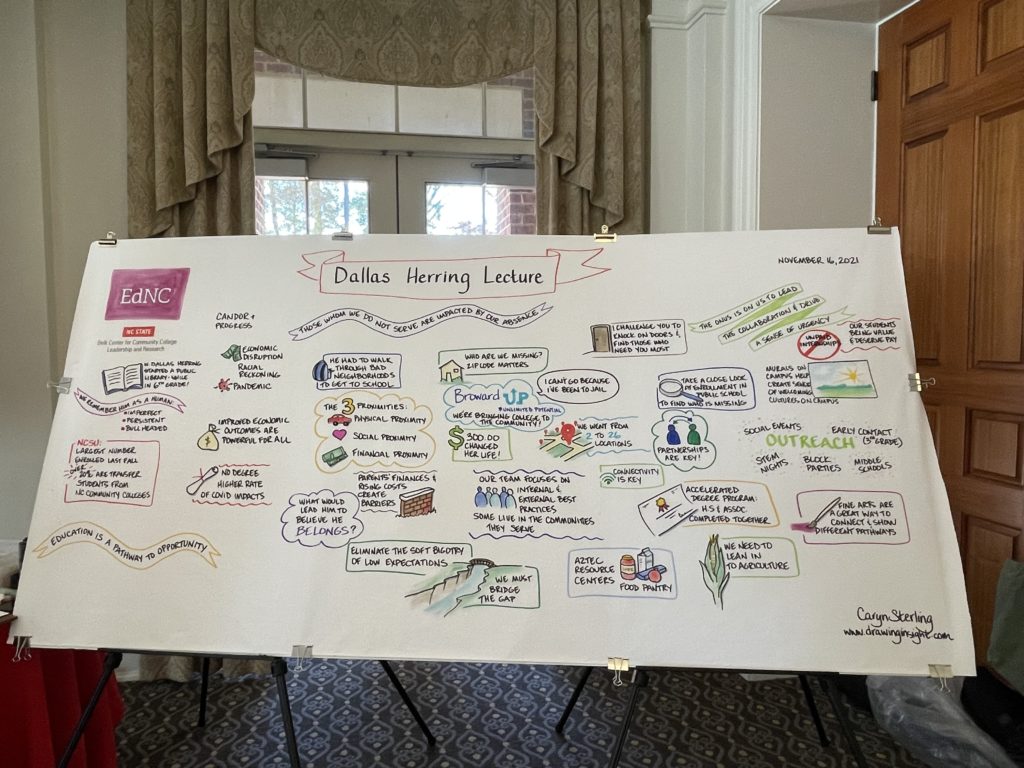

Broward College, where Haile has served as president since 2018, tackled the three proximities in a variety of ways.
In 2018, the college launched Broward UP, a model that would address a critical shortcoming of the college: that few of Broward’s students hailed from their most challenged communities.
To address physical proximity, Haile said Broward College took the college to the community instead of expecting the community to come to the college. Broward examined zip codes within their county and identified six zip codes with the highest unemployment rates. Those six zip codes became the Broward Up communities.
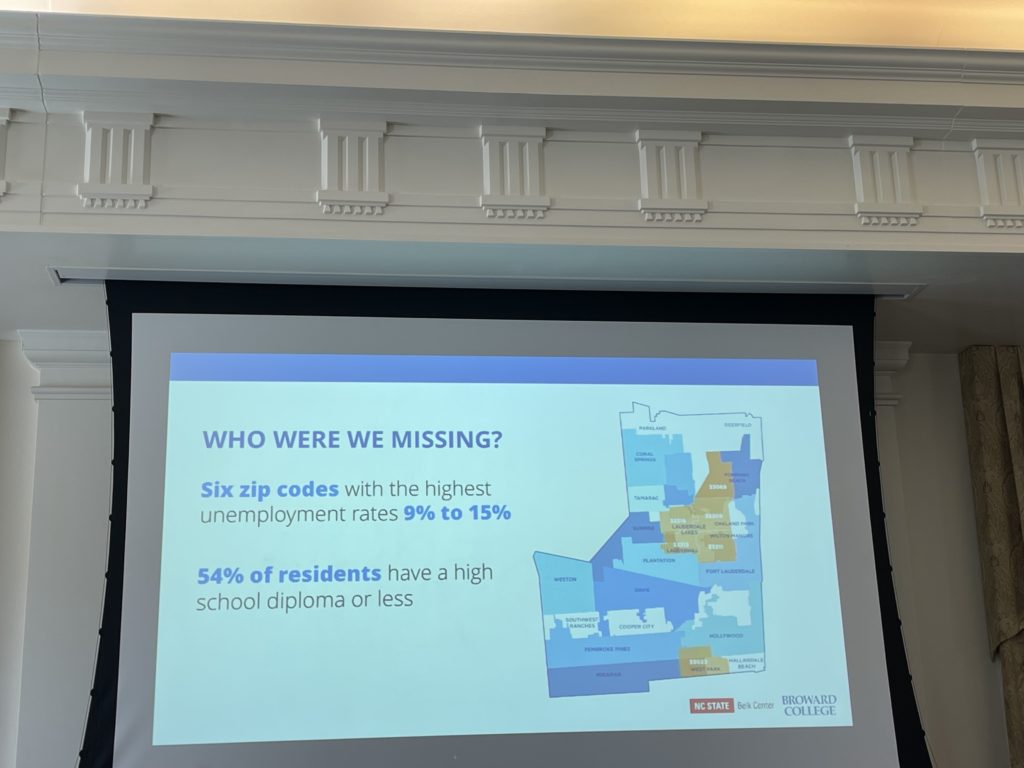

Broward College addressed social proximity by creating partnerships with trusted and familiar organizations in their targeted communities. The partners offer essential services like classroom space, technology access, and community outreach.
Broward College uses a case management model to find solutions on a case-by-case basis.
“The Broward UP case management model helps students with customized goal setting and educational planning. Students connect with Broward UP in their community, at local events and community locations, and from there, they work with a case manager, known as Career Pathway Navigators or Navigator. They set short- and long-term goals and then identify in-demand certificates and industry certifications that provide for quick wins,” Haile said.
As for the financial proximity, Haile said that as Broward College has become physically proximate and socially proximate, it has increased its financial proximity.
Broward UP students have access to courses at no cost to them. And the college offers a variety of free workshops and workforce training courses. Broward UP participants can also access emergency funding up to $1,000 to cover a variety of needs including technology, clothing for career interviews, and external certification exam fees.
Haile says focusing on the power of proximity yields results, and Broward UP is proof of that.
“Thousands of residents now have access to postsecondary education in a location physically proximate to their home,” he said.
Over the past four years, Broward UP has served 3,079 individuals and has awarded more than 3,000 workforce-ready certificates and industry certifications.
According to Haile, the residual benefits include $556,000 annually in projected tax revenue based on current Broward UP students who are expected to spend more on taxable goods and services.
But Broward College is not alone in its embrace of the “Power of Proximity.”
Haile pointed to several community colleges including Wake Technical Community College, which is offering non-degree short-term courses at the local YMCA. He also talked about Pitt Community College, which uses off-campus locations to identify and assess the needs of their service area.
Before concluding, Haile challenged the attendees.
“I challenge you to not only think about those that you are serving, but to think about those you are missing.”
– Gregory Adam Haile, president of Broward College
Haile closed with these words:
“When I accepted the presidency of Broward College, I promised that I would spend my time focusing more on doing my job than simply keeping my job. This can feel uncomfortable. But our jobs were never just to keep the train on the tracks. Our job includes making sure that everyone is on the train.”
Following Haile’s lecture, a live panel with three community college leaders took place. Each of the three leaders shared insights, key takeaways from Haile’s remarks, and how their institutions are embracing proximity. The panel included Dr. Pamela Senegal, president of Piedmont Community College; Lee D. Lambert, chancellor of Pima Community College in Arizona; and Dr. Sunita “Sunny” Cooke, superintendent and president of MiraCosta Community College District in California.

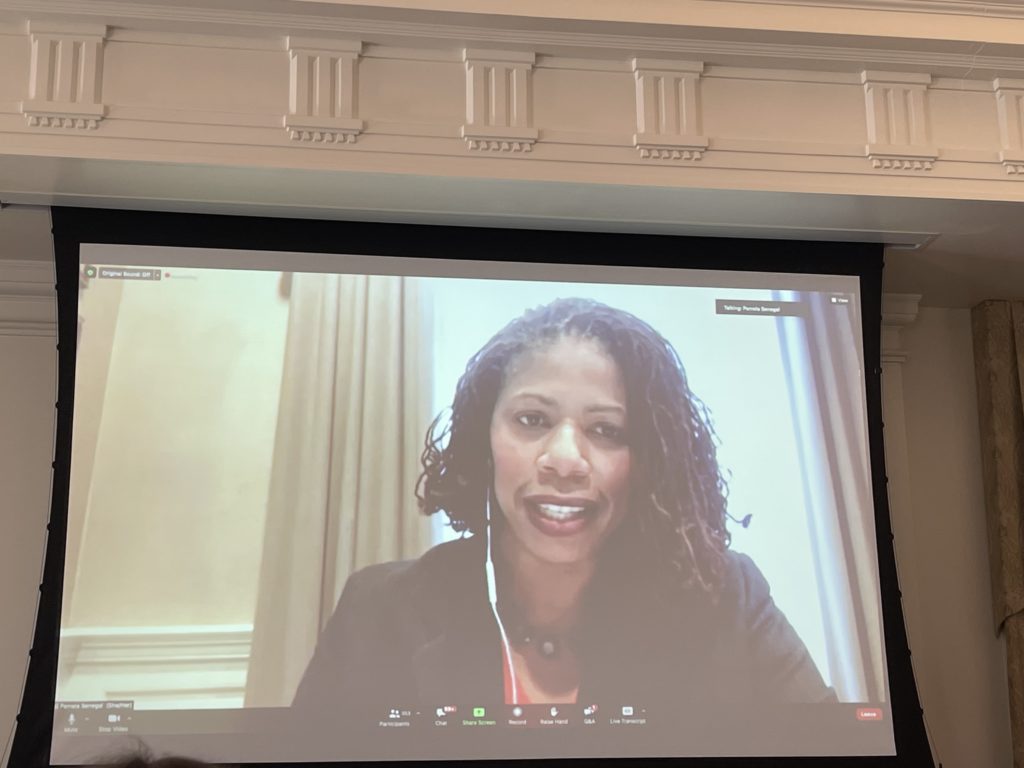
Dr. Pamela Senegal. Emily Thomas/EducationNC 
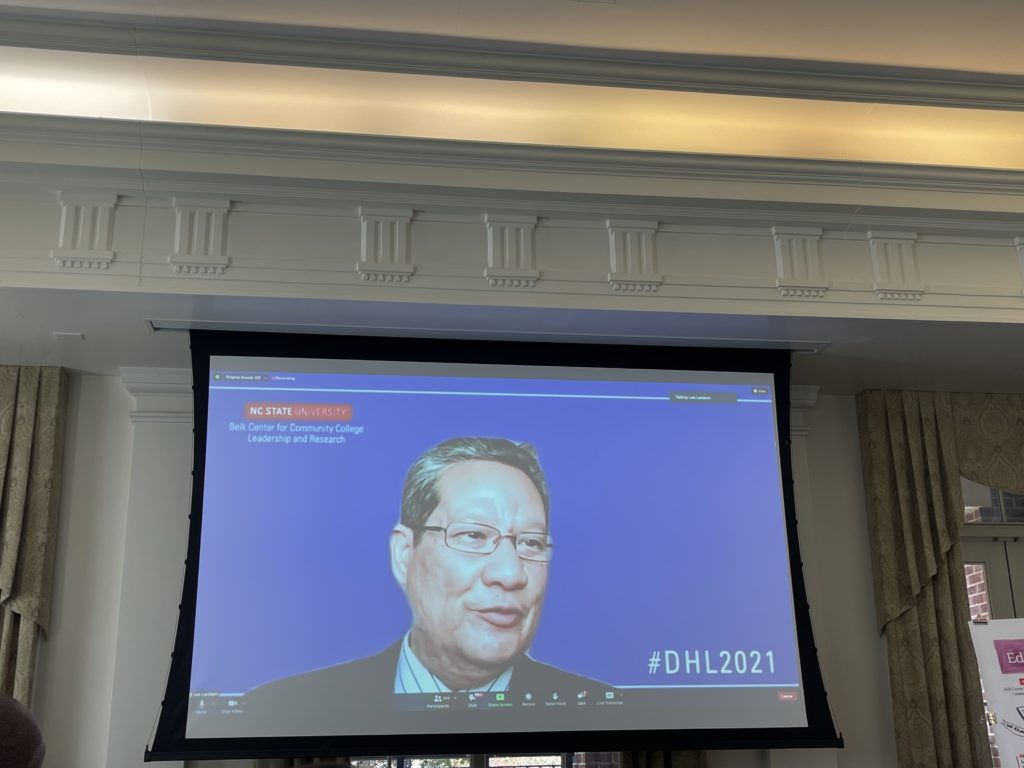
Lee D. Lambert. Emily Thomas/EducationNC 
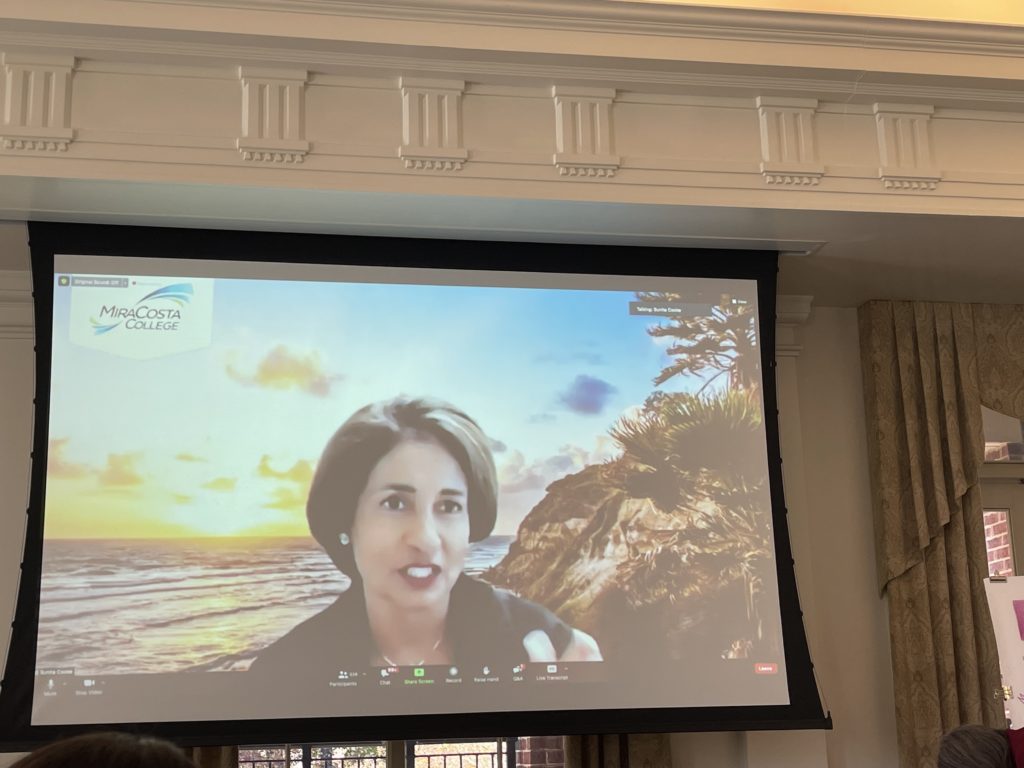
Dr. Sunita “Sunny” Cooke. Emily Thomas/EducationNC
The event also included the announcement of the 2021 I.E. Ready Award which honors an N.C. State University graduate for exceptional leadership in the community college system. This year, Dr. Mark Kinlaw, president of Rockingham Community College, was the recipient of the I.E. Ready Award. EdNC will have a follow up article about Dr. Kinlaw’s work in North Carolina’s community colleges and his response to receiving the award.

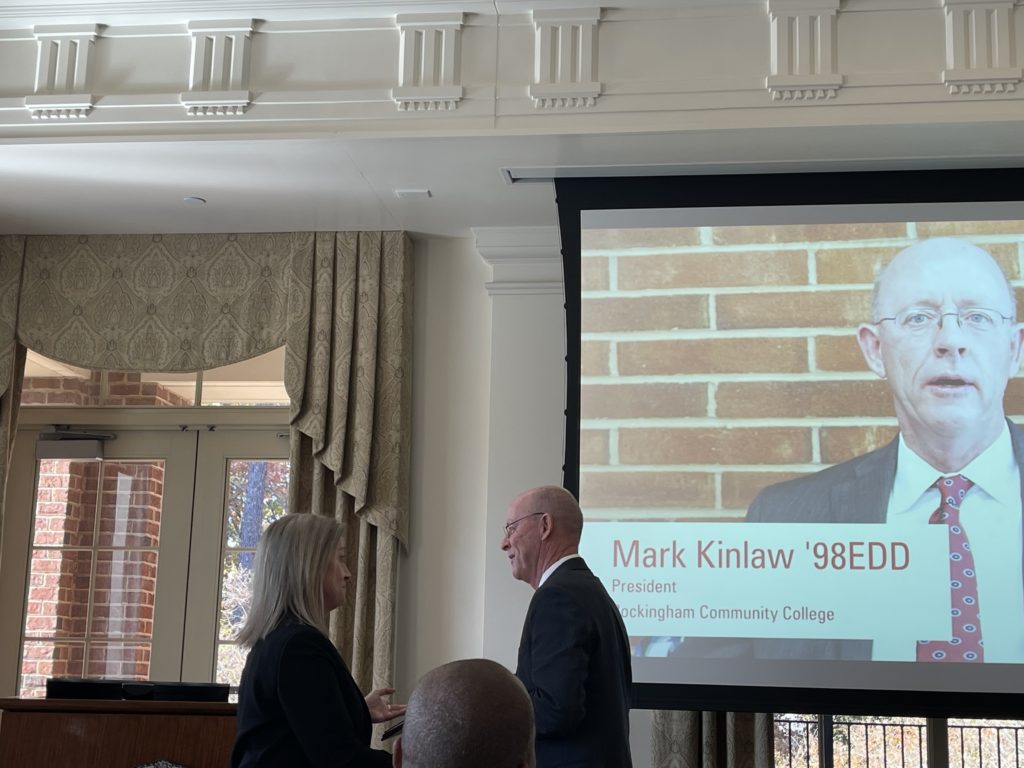
Dr. Audrey Jaeger (left) and Dr. Mark Kinlaw. Emily Thomas/EducationNC 
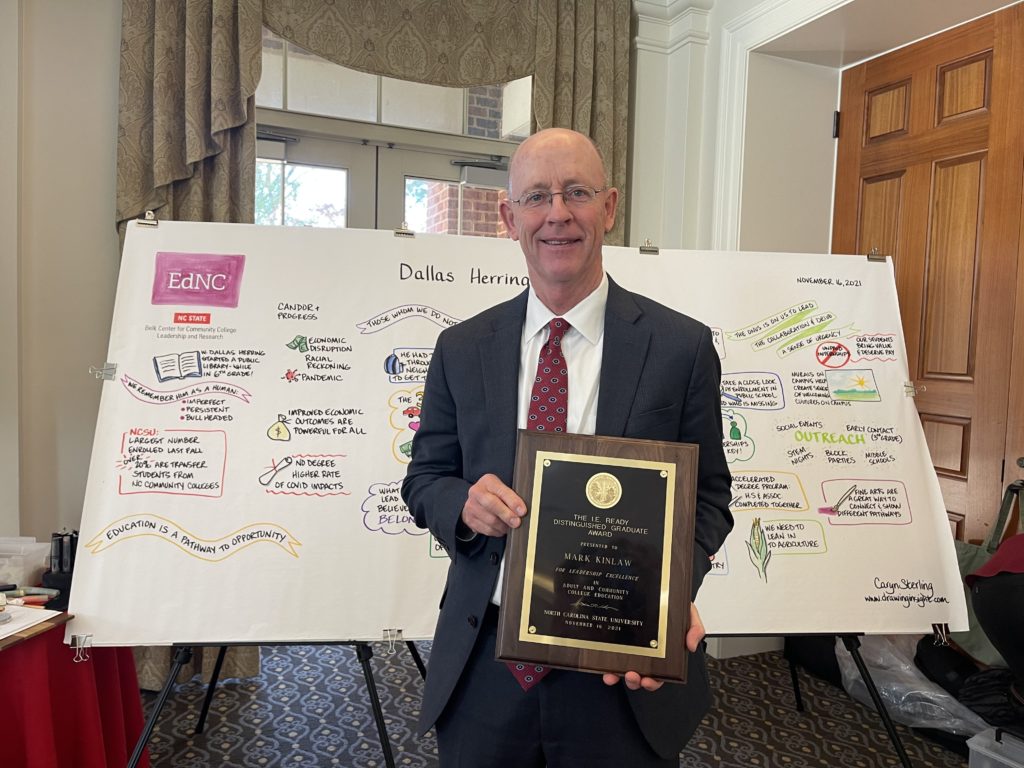
Dr. Mark Kinlaw. Emily Thomas/EducationNC



